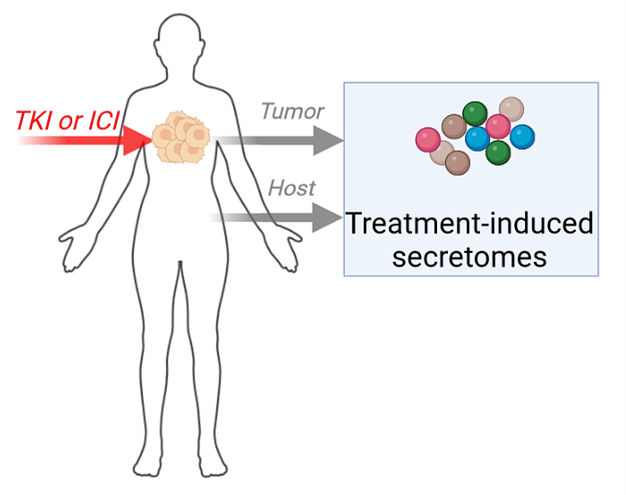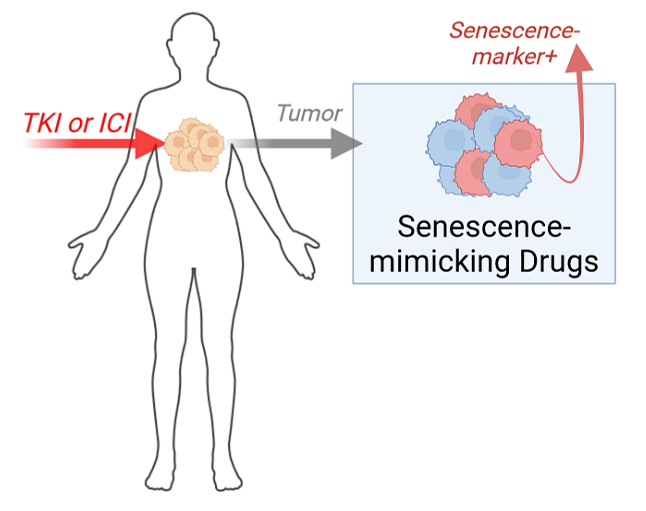Exploiting drug side-effects to improve immunotherapy
All cancer drugs have side effects. Our lab studies the unexpected collateral side effects of targeted therapies that can impact tumor and non-tumor cell populations, intracellular signaling programs and extracellular secretory machinery.
These side effects have the potential to be exploited as biomarkers of drug efficacy/toxicity and to be future drug targets that will help overcome resistance.
Treatment-induced secretomes
Our lab studies a common drug side effect that includes the secretion of proteins. Treatment-induced secretomes (therasomes) are activated by antiangiogenic and immune checkpoint inhibitors and can be exploited as biomarkers of treatment efficacy, drug dosing and predict patient relapse.
Key papers
- Shi Y, Dolan M, Mastri M, Hill JW, Dommer A, Benzekry S, Ebos JML. Acquired resistance to PD-L1 inhibition is associated with an enhanced type I IFN-stimulated secretory program in tumor cells. (2025) EMBO Reports 26(2):521-559.
- Mastri M, et al. Tumor-Independent Host Secretomes Induced By Angiogenesis and Immune-Checkpoint Inhibitors. Mol Cancer Ther. 2018 Jul;17(7):1602-1612. doi: 10.1158/1535-7163.MCT-17-1066.
- Ebos JM, Kerbel RS. Antiangiogenic therapy: impact on invasion, disease progression, and metastasis. Nat Rev Clin Oncol. 2011 Mar 1;8(4):210-21. doi: 10.1038/nrclinonc.2011.21.
Senescence-mimicking drugs
Senescence is a form of cellular aging that can be induced by many cancer drugs. Our lab has discovered that antiangiogenic TKIs can induce a senescence-mimicking effect (senomimetic) which can drive the secretion of proteins that fuel tumor-promoting programs and resistance.
Our recent work demonstrates that senomimetic drug side effects can also activate immune-modulating signaling that can “prime” tumors for better responses to immune checkpoint inhibition.
Key papers
- Dolan, et al. A senescence-mimicking (senomimetic) VEGFR TKI side-effect primes tumor immune responses via IFN/STING signaling. Mol. Can. Ther. 2024 (in press). doi: 10.1158/1535-7163.MCT-24-0139
- Mastri M, et al. A Transient Pseudosenescent Secretome Promotes Tumor Growth after Antiangiogenic Therapy Withdrawal. Cell Rep. 2018 Dec 26;25(13):3706-3720.e8. doi: 10.1016/j.celrep.2018.12.017. PMID: 30590043.
- Mastri M, Ebos JML. Tumor growth fueled by spurious senescence phenotypes. Mol Cell Oncol. 2019 Feb 20;6(2):1575707. doi: 10.1080/23723556.2019.1575707.
Connect with the Ebos Lab
EmailX (Twitter)BlueSkyLinkedIn
Department of Cancer Genetics & Genomics
Roswell Park Comprehensive Cancer Center
Elm and Carlton Streets
Buffalo, NY 14263


